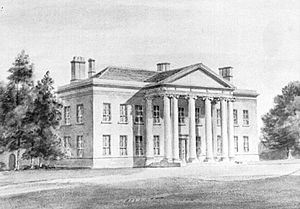Sir Edward Bayntun-Rolt, 1st Baronet facts for kids
Quick facts for kids
Sir
Edward Bayntun-Rolt
1st Baronet, of Sacombe and Spye Park
|
|
|---|---|
| Member of Parliament for Chippenham |
|
| Personal details | |
| Born |
Edward Rolt
1710 Sacombe, Hertfordshire |
| Died | 3 January 1800 |
| Resting place | St Nicholas Church, Bromham, Wiltshire |
| Citizenship | British |
| Nationality | British |
| Spouse | Mary Poynter |
| Parents |
|
| Occupation | Landowner, politician |
Sir Edward Bayntun-Rolt (born 1710, died 1800) was an important person in British history. He owned a lot of land and was a politician. He was a member of the Whig party. Sir Edward worked in the House of Commons for a very long time, from 1737 to 1780. This is where laws were made in Britain.
One of his elections in 1741 was very important. It helped lead to the powerful Prime Minister, Sir Robert Walpole, leaving his job.
Contents
Early Life and Family
Edward Rolt was born in 1710. His father was Edward Rolt from Sacombe, a place in Hertfordshire. His mother was Anne Bayntun. Her father was Henry Bayntun from Spye Park.
When Edward's uncle, John Bayntun, passed away in 1717, Edward inherited the Bayntun family's properties. These included Spye Park and other lands. Because of this, he added "Bayntun" to his name, becoming Edward Bayntun-Rolt.
His Time in Politics
Owning the Spye Park estate gave Bayntun-Rolt a lot of influence in the area. This helped him get a seat in Parliament for the town of Chippenham. He was first elected as a Member of Parliament (MP) in 1737. He was part of the Whig party, but he was against the government at the time.
A Big Moment in History
In the 1741 election, Sir Edward Bayntun-Rolt was re-elected. He ran with another candidate who was also against the government. They won against two candidates who supported the government.
The two losing candidates complained about the election results. This complaint became a huge test of power. It was a fight between Sir Robert Walpole, who was like the Prime Minister, and his opponents.
On January 31, 1742, the complaint was rejected. This meant Bayntun-Rolt and his partner kept their seats. This event was so important that it led to Sir Robert Walpole resigning. He had been in power for 20 years.
Later Political Career
In 1745, Bayntun-Rolt got a job working for Frederick, the Prince of Wales. But he was dismissed from this job in 1746.
For the 1747 election, he received money to help with his campaign costs. After the Prince of Wales died in 1751, Sir Edward got a new job. He became the surveyor general for the Duchy of Cornwall. This was a good job that paid him well, and he kept it for 45 years.
He received more money for his election campaigns in 1754 and 1761. In 1761, even though the government didn't give money for elections, he was given a special payment.
In 1762, he was given the title of Baronet. This is a special honor from the King. He was elected as an MP for Chippenham two more times, in 1768 and 1774. He decided not to run for election in 1780.
Family Life and Legacy
Sir Edward Bayntun-Rolt married Mary Poynter. She was from Herriard, Hampshire. They were married before 1743 and again in 1750. They had two children:
- Andrew Bayntun-Rolt (1755-1816), who became the second and last Baronet.
- Elizabeth Bayntun-Rolt (1758-1798), who married Henry Stone.
Mary, his wife, passed away in 1799 at Spye Park.
Sir Edward Bayntun-Rolt died on January 3, 1800. His son, Andrew, inherited his title as Baronet.
There is a special memorial for him in St Nicholas' Church in Bromham, Wiltshire.
 | Chris Smalls |
 | Fred Hampton |
 | Ralph Abernathy |


